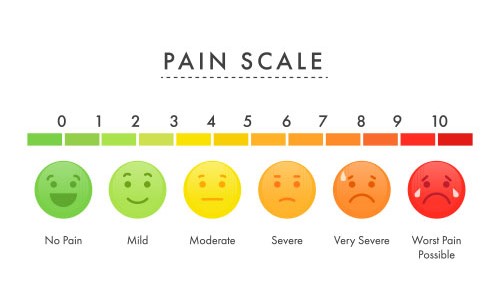
How would you describe a painful gout flare? “Intense? Crushing? Fiery? Excruciating? Overwhelming? Unbearable?” Given a standard scale of 1 to 10, with 10 being the worst pain imaginable, most people with gout rate the pain of a flare as a 9 or a 10.1 And according to the results of a 2016 Gout Education Society survey, more than 40% of people with gout believe that nothing hurts more than a flare.2 But how can you avoid painful gout attacks? Read on to find out more about gout and gout flare prevention.
How gout flares start
Uric acid is a naturally occurring substance we all have in our bodies.3 For most people, uric acid is released by the kidneys and eliminated in the urine as a waste product.4 Sometimes, however, the body either produces too much uric acid or the kidneys release too little.3,4 When this happens, the uric acid level in the bloodstream rises.4 If the uric acid level remains abnormally high for a long time, tiny, needle-shaped urate crystals can begin to form around a joint.4 Thus, gout occurs when extra uric acid in the body forms crystals in the joints.4 For most people, the first joint to be affected by gout is the big toe.4
What happens during a gout attack
Gout flares are caused by the body’s inflammatory response to the urate crystals that have formed in a joint.5 These crystals can set off a chain of events that results in sudden and dramatic swelling, redness and intense pain.5 Although gout attacks can occur at any time, they are most likely to happen at night or early in the morning.6 It is believed that the reduction in the body’s temperature overnight coupled with nighttime dehydration (both of which are normal) often are to blame.6
How gout flares compare
Many people suffering a gout attack go straight to the emergency room in search of relief.1 If that seems extreme, consider how participants in a 2019 survey conducted by the Gout Education Society compared the pain of a gout flare to that of other acute conditions7:
- 39% felt that a gout flare was more painful than a severe burn
- 36% felt that a gout flare was more painful than kidney stones
- 34% felt that a gout flare was more painful than breaking a bone
- 29% felt that a gout flare was more painful than childbirth
- 25% felt that a gout flare was more painful than being hit by a car
Why it’s important to take gout seriously
Untreated gout can result in significant disability and diminished quality of life.3 In spite of the potential for permanent bone, joint and tissue damage, however, many people with gout do not take the disease seriously.2 According to the results of the previously mentioned 2016 survey, more than half of people who suffer with gout felt that treating the disease was not a priority.2 Just a third of respondents said they “strongly agree” that gout is just as serious as their other health problems.2 Dr. N. Lawrence Edwards, chairman of the Gout Education Society, says, “These perceptions need to be changed … gouty arthritis is very painful, very serious and requires immediate and ongoing medical attention.”2
How you can prevent gout flares
If you suspect you have gout but have not yet been diagnosed, make an appointment with your doctor (consider completing this Doctor Visit Form beforehand). Your doctor will most likely check your uric acid level.3 He or she may also order additional tests to confirm a gout diagnosis.3 If you are diagnosed with gout, your doctor may recommend a urate-lowering therapy (ULT) such as allopurinol to reduce the amount of uric acid in your bloodstream.8 Your doctor may also prescribe a colchicine product such as Mitigare® (Colchicine) 0.6mg Capsules or Generic Colchicine 0.6mg Capsules to prevent gout flares, especially if you are starting treatment with a ULT.9 Whether you’re newly diagnosed or have had gout for years, be sure to get your uric acid checked every six months.10 Maintaining a healthy level (6.0 mg/dL or below for most people) is one of the most important things you can do to manage the disease and prevent gout flares.10
Mitigare® is a registered trademark of Hikma Pharmaceuticals USA Inc.
Colchicine 0.6 mg capsules are contraindicated in patients with renal or hepatic impairment who are currently prescribed drugs that inhibit both P-gp and CYP3A4. Combining these dual inhibitors with colchicine in patients with renal or hepatic impairment has resulted in life-threatening or fatal colchicine toxicity. Patients with both renal and hepatic impairment should not be given Mitigare®.
Fatal overdoses have been reported with colchicine in adults and children. Keep Mitigare® out of the reach of children.
Blood dyscrasias such as myelosuppression, leukopenia, granulocytopenia, thrombocytopenia and aplastic anemia have been reported with colchicine used in therapeutic doses.
Monitor for toxicity and, if present, consider temporary interruption or discontinuation of colchicine.
Drug interaction with dual P-gp and CYP3A4 inhibitors: Co-administration of colchicine with dual P-gp and CYP3A4 inhibitors has resulted in life-threatening interactions and death.
Neuromuscular toxicity and rhabdomyolysis may occur with chronic treatment with colchicine in therapeutic doses, especially in combination with other drugs known to cause this effect. Patients with impaired renal function and elderly patients (including those with normal renal and hepatic function) are at increased risk. Consider temporary interruption or discontinuation of Mitigare®.
The most commonly reported adverse reactions with colchicine are gastrointestinal symptoms, including diarrhea, nausea, vomiting and abdominal pain.
Please see the full Prescribing Information and Medication Guide for Mitigare® for complete product details.
NOTE: This article was not written by a medical professional and is not intended to substitute for the guidance of a physician. These are not Hikma’s recommendations for gout flare prevention, but rather facts and data collected from various reliable medical sources. For a full list of resources and their attributing links, see below.
